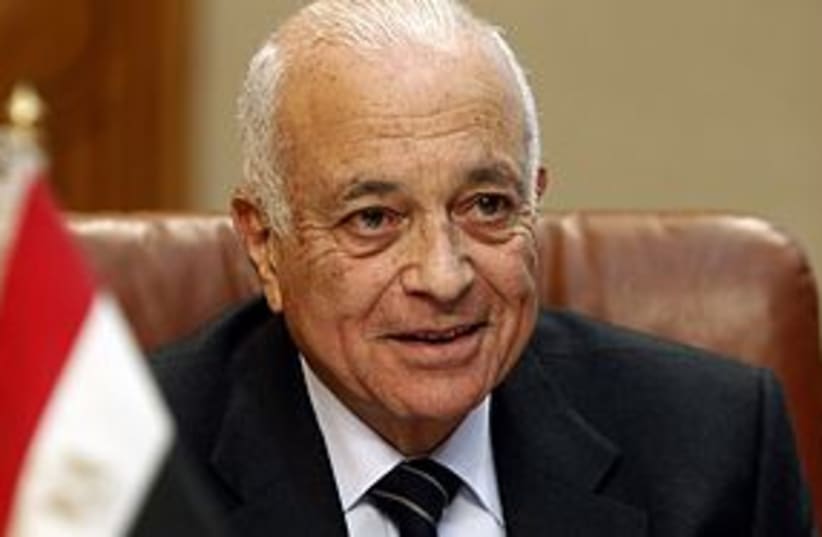NEW DIPLOMATIC TRACKEgypt initially fielded a career diplomat Mostafa Fekki, a former member of parliament for Hosni Mubarak's ruling party although he quit his post during the 18-day uprising that led to the Egyptian president being pushed from power on Feb. 11.But Egypt at the last minute switched its candidate to Elaraby, a former judge at the International Court of Justice and previously Egypt's representative at the United Nations.Elaraby, appointed foreign minister after Mubarak was ousted, has carved a new diplomatic track for Egypt since becoming minister. He has been a tougher critic of Israel, more supportive of Palestinians and offered an opening to Iran."The Arab League is facing a major challenge. It needs restructuring, face lifting and a new spirit that should reflect the aspirations of the Arab people for more freedom," said Anissa Hassouna from the Egyptian Council for Foreign Affairs.Egypt's state news agency announced the change in Cairo's candidate and then Qatar-based channel Al Jazeera reported the withdrawal of Qatar's Abdulrahman bin Hamad Al-Attiyah, a former secretary-general of the six-nation Gulf Cooperation Council."It seemed that Qatar and Egypt were going to have to win or lose at the expense of the other and withdrawing both candidates is likely to have been a compromise," said Abou Taleb.Moussa, known for his outspoken comments including criticism of the U.S.-led Iraq war that he said would open "the gates of hell", is running as a candidate in an election to become Egypt's next president.Elaraby was Egypt's permanent representative to the United Nations and director of the Regional Cairo Centre for International Commercial Arbitration before replacing Ahmed Aboul Gheit as foreign minister in March.He received a degree from Cairo University's Faculty of Law in 1955, a masters in international law and later a doctorate in juridical science from New York University Law School.Elaraby served as the head of Egypt's delegation to negotiate an end to the Taba border dispute between Egypt and Israel that was settled by international arbitration in Egypt's favour and was also a legal adviser to the Egyptian delegation during the Camp David Middle East Peace Conference in 1978.
Arab League confirms Nabil Elaraby as its next head
Egypt FM takes post from Amr Moussa; Elaraby is Cairo-born and New York-educated; negotiated end to Taba border dispute.

NEW DIPLOMATIC TRACKEgypt initially fielded a career diplomat Mostafa Fekki, a former member of parliament for Hosni Mubarak's ruling party although he quit his post during the 18-day uprising that led to the Egyptian president being pushed from power on Feb. 11.But Egypt at the last minute switched its candidate to Elaraby, a former judge at the International Court of Justice and previously Egypt's representative at the United Nations.Elaraby, appointed foreign minister after Mubarak was ousted, has carved a new diplomatic track for Egypt since becoming minister. He has been a tougher critic of Israel, more supportive of Palestinians and offered an opening to Iran."The Arab League is facing a major challenge. It needs restructuring, face lifting and a new spirit that should reflect the aspirations of the Arab people for more freedom," said Anissa Hassouna from the Egyptian Council for Foreign Affairs.Egypt's state news agency announced the change in Cairo's candidate and then Qatar-based channel Al Jazeera reported the withdrawal of Qatar's Abdulrahman bin Hamad Al-Attiyah, a former secretary-general of the six-nation Gulf Cooperation Council."It seemed that Qatar and Egypt were going to have to win or lose at the expense of the other and withdrawing both candidates is likely to have been a compromise," said Abou Taleb.Moussa, known for his outspoken comments including criticism of the U.S.-led Iraq war that he said would open "the gates of hell", is running as a candidate in an election to become Egypt's next president.Elaraby was Egypt's permanent representative to the United Nations and director of the Regional Cairo Centre for International Commercial Arbitration before replacing Ahmed Aboul Gheit as foreign minister in March.He received a degree from Cairo University's Faculty of Law in 1955, a masters in international law and later a doctorate in juridical science from New York University Law School.Elaraby served as the head of Egypt's delegation to negotiate an end to the Taba border dispute between Egypt and Israel that was settled by international arbitration in Egypt's favour and was also a legal adviser to the Egyptian delegation during the Camp David Middle East Peace Conference in 1978.